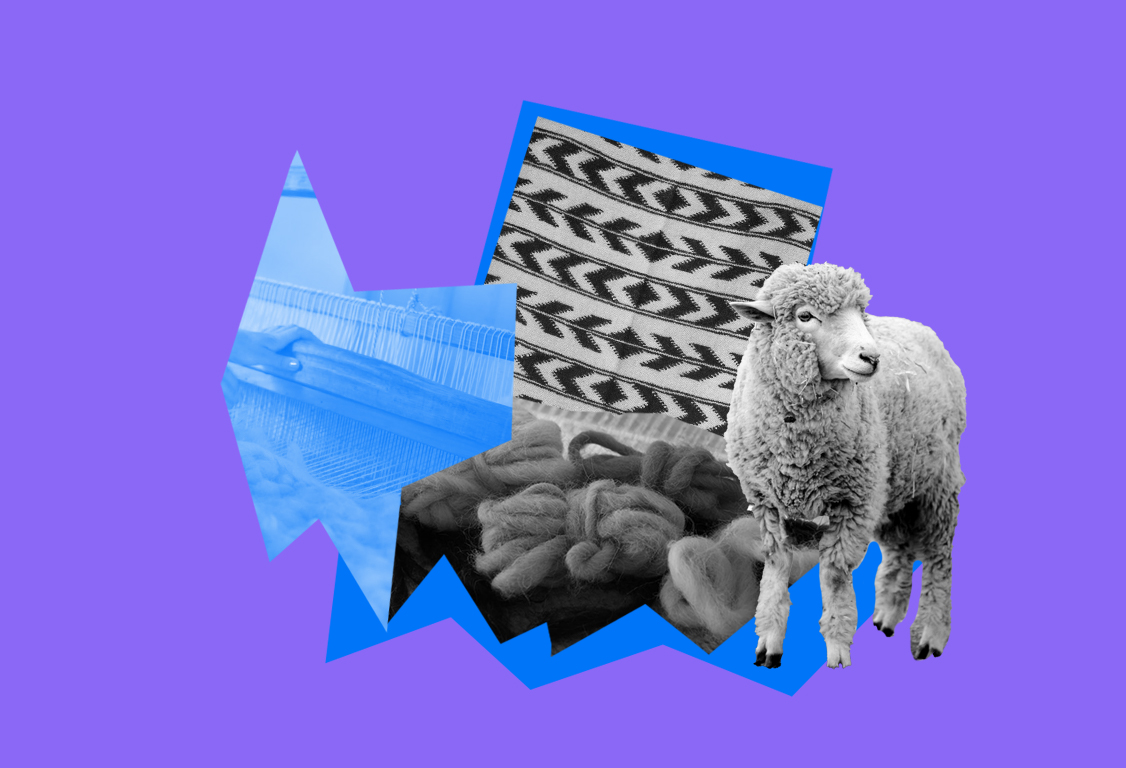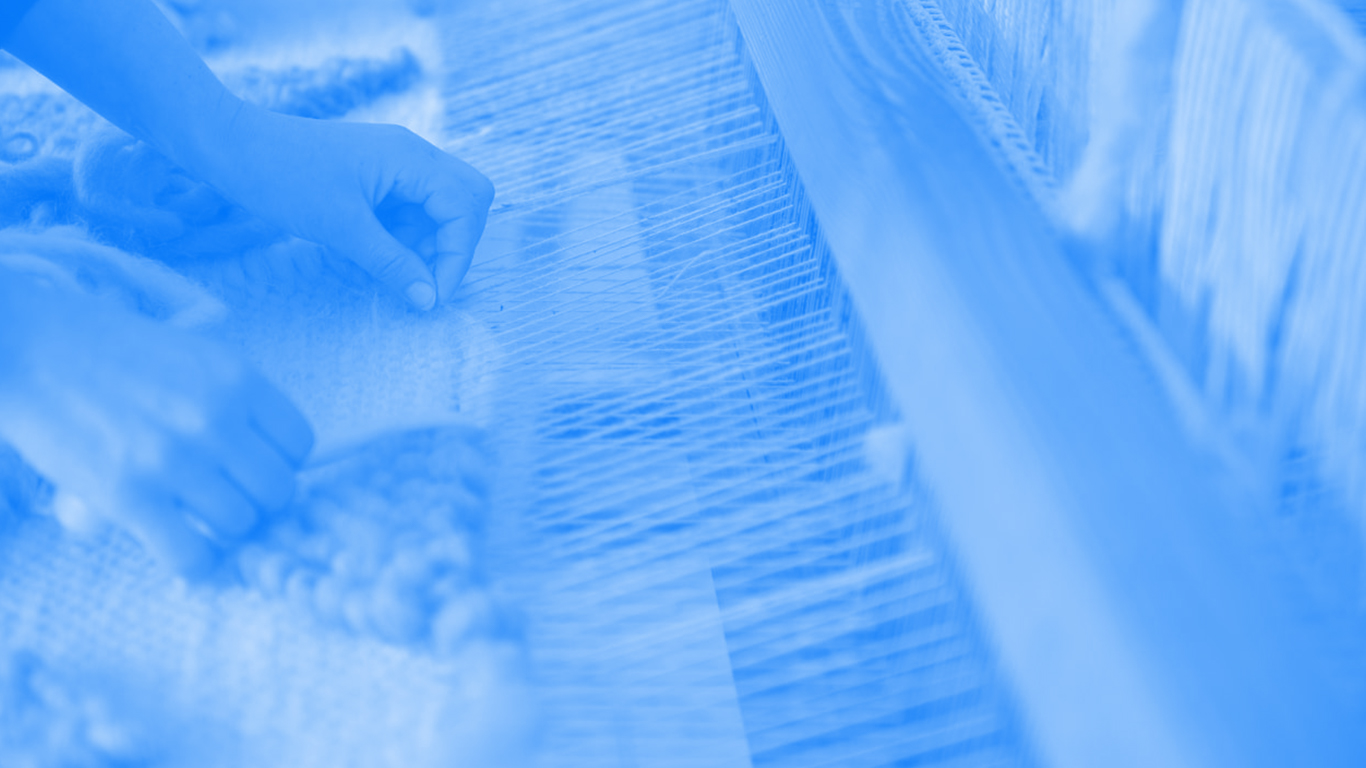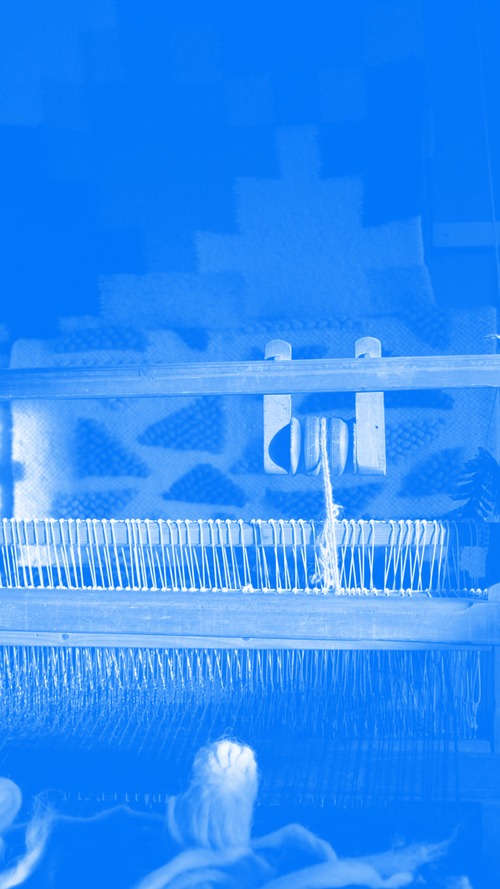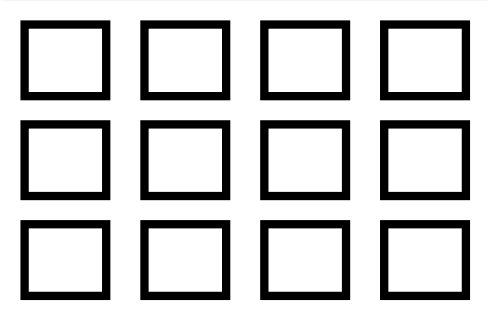Warmth born in the mountains: how the Gushka woollen goods workshop was founded

How to create a modern business based on traditional Carpathian crafts? How to maintain a shaky balance between the authentic and the modern? Where to look for old patterns of traditional woollen blankets and the inspiration for new goods? We talked about all this with Natalia Stavnycha, CEO of the Creative Business Survival Kit graduate project Gushka.
Thread by thread
It all started with Didova Khatchyna (Grandfather’s House), a small house high in the mountains, where are no roads, where you cannot get to by car, surrounded by the beauty of the Carpathians. Its owners, inspired by nature, decided to start another business called Gushka.
What is a gushka? This is a skein of woollen threads. First, the sheep are sheared, and then the wool is processed, cleaned, and washed until a fluffy cloud of pure wool is formed. Then it is spun, forming a large skein of knitting threads.
The Gushka brand appeared in Yavoriv in 2017 and started with traditional Carpathian woollen blankets. Everything was authentic: materials, patterns, and sizes. In this way, the founders sought to popularise Ukrainian culture and traditions, as well as to show that centuries-old designs can be incorporated into modern interiors, because they are durable and have a wonderful look.
Gradually, the project developed, and modern woollen carpets started to be produced along with woollen blankets. And ordinary woollen blankets are made in the traditional ‘smooth’ technique. Gushka does not modernise them, does not use new techniques, and does not change them. They create something new exclusively with carpets and rugs. “We are open to innovation and can produce literally anything, but we do not experiment with woollen blankets,” Natalia Stavnycha explains. Carpets are made from the same gushkas, using the same technologies — no synthetics. Currently, the brand’s assortment includes rugs, padded stools, pillows, and traditional Carpathian rugs.
Inspired by nature, devoted to traditions
Gushka has three collections: Huk, Forest, and Field. They were inspired by the forces of nature. The Huk is a waterfall, so the collection leads us to stones, water, and smooth lines. The Wood is three-dimensional elements. The Field is a reminder of the heritage of the ancestors and the rich land that needs to be cultivated. Today, the team is developing a new collection that is also inspired by the beauty of nature.
Raw materials for production are purchased from local Carpathian farmers. The brand has its own flock of 200 sheep, but this is not enough. In the future, the team dreams of fully covering production needs. However, it is still too expensive.
Liuba Rybenchuk, a third-generation weaver, is in charge of production. Together with Daryna Lukaniuk, an inspirator behind the project, Liuba transfers the beauty of nature to goods, particularly carpets. They draw sketches, create the drawing in such a way as to reproduce it with thread on the machine.
“We regularly look for new techniques both in ancient books and in modern sources. However, woollen goods are not so popular that they can be copied from something else. This is an individual approach to each thing, in which a maximum of soul and values are invested,” Natalia summarises.

Strongly tied
Liuba Rybenchuk is not just a weaver, but a project technologist and business partner. When Oleh Lukaniuk, the founder of Didova Khatchyna, is asked why a partnership, when it was possible to just hire a weaver for a job, he explains that, in his opinion, a partnership is the only possible type of business. Because it is important to invite a person who would also support the product and the company. Invite not just to work, but to the family, to create a powerful brand together.
Despite the war and all the troubles, the brand team is growing. The first month after the Russian full-scale invasion of Ukraine seemed difficult for the project. However, people here are convinced that it is much easier to deal with any situation together. So on February 24, workers were in the workshop and continued to fulfil orders, not knowing what tomorrow would bring.
“At the beginning of the war, we did not know where we stood, or whether we would be able to continue our work, so we decided to join the Creative Business Survival Kit project of the House of Europe. We had to look for different ways of additional financing to shift the vector of sales to foreign partnerships. The participation helped us to understand development prospects and possible sales markets,” notes Natalia.

Later, some of the girls decided to go abroad for safety, while some, on the contrary, joined the team after returning to Kosiv. Buyers who paid for orders with the words “we just want to support you, you can send the carpet later when you are calm” added strength. Within a month, the workshop returned to full-time work, resumed active posting on social networks, and completed the website. Products flew around the world: to Europe, Asia, America, and Canada.
This year, a weaver from Odesa joined the team. “For us, it is valuable not only to preserve the traditions of making woollen blankets within the region but also to spread them throughout Ukraine and the world, to make even more people fall in love with them,” Natalia Stavnycha notes.
Take care of your own traditions
Gushka does not depend on foreign goods or services. Natalia explains: “The wool is Carpathian, the material is Ukrainian home-spun cloth, so there are no problems with raw materials. Everyone who worked in the team stayed with us. Yevhen, the previous CEO of the project, and Oleh, the founder of the brand, are currently at the front, so the team is keeping their fingers crossed for the guys and is sincerely proud of them.
The project does not remain unnoticed by people. A lot of support comes from Ukrainians living abroad, foreigners, the diaspora, and various media and platforms that promote Ukrainian goods. Business, in turn, gives a significant part of profits to the Armed Forces of Ukraine.
“We would advise Ukrainian young projects to believe in their own strengths and the strength of Ukrainian culture. To be inspired by our history and traditions, to give them a second life. Recently, we were at an exhibition in the Czech Republic, and one Frenchman very emotionally explained to me that our products are not modern. That, they say, Europe is ready for new bright shapes and colours. But for what? Ukrainian culture is rich, we have so much experience of our ancestors that we can use it and not reinvent the wheel. These traditions do not bind, and the patterns and techniques are quite suitable for the modern embodiment of our own ideas,” explains the CEO of the project.
Gushka also carries out educational work, in particular, organising master classes on weaving, which tell about the traditional craft and spread it beyond the borders of the Carpathian centres. It is another way for the team to share work they truly love.
“Completely manual work is a unique phenomenon for both Ukrainian and global consumers. To have a carpet at home, the wool for which was taken from a sheep that grazes on pasture, a carpet that was washed in a mountain river and dried in the mountain winds — in my opinion, this cannot be compared to any factory product. We protect nature, treat it with respect, and value traditions and manual labour. This is the message that Gushka carries to the world. Every person in the team sincerely supports and understands the value of this product,” Natalia concludes. Today, the team plans to expand production and help the country get closer to victory.

Gushka graduated Creative Business Survival Kit. Until 13 January, we are looking for 15 more indomitable creative businesses to offer personal consultations with business experts and EUR 1,000 for the most pressing changes. Feel free to apply!
Text: Oleksandra Vlasyuk
Translation: Julia Didokha


